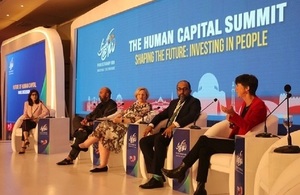DFID funded Pakistan@100 report launched by the World Bank
Shaping the Future report was launched by the World Bank with support of the British High Commission and UK Aid at the Human Capital Summit event in Islamabad

The report highlights the need to invest more in human capital so that people are better educated, healthier and equipped with the skills needed to help Pakistan continue to grow in the future. If Pakistan takes action on these issues, it has the potential to become an upper-middle income country by the time it turns 100 in 2047.
The report predicts a deep-rooted economic transformation by improving human capital investment, boosting productivity, promoting social and environmental sustainability, ensuring good governance, and leveraging its location to connect more with neighbours and the world beyond. Pakistan must work on health and nutrition, population growth, early childhood development and most importantly women empowerment and other areas of inclusive development to achieve its true potential by 2047.
Acting British High Commissioner Richard Crowder said:
Pakistan @ 100 defines the choices that face this country. The UK is delighted to be associated with such a world-class contribution to the debate. I encourage all those who care about Pakistan and its future to read this report, and reflect on its conclusions.
The UK and Pakistan have stood together for more than seventy years, with shared ties of people, history, trade, sport and education. We look forward to working with the people and Government of Pakistan to 2047 and beyond.
Head of DFID Pakistan, Joanna Reid, said:
I am absolutely driven by the idea of a tolerant and prosperous Pakistan @100 and I believe investing in human capital, particularly women, can help Pakistan achieve its full potential.
Empower women, give them choices, increase spending on their education and health and we will see Pakistan achieving its goals before it turns 100.
The report also covered health and nutrition issues faced by women and children in Pakistan. Pakistan continues to have one of the highest stunting rates in the world. Many children do not attend school and those who attend are not being taught the necessary skills to succeed in today’s economy.
The UK is Pakistan’s biggest bilateral aid donor and is investing in health, education and a more prosperous and stable Pakistan.
Further information
- The World Bank report on Pakistan@100 can be found here
For updates on the British High Commission and the Chevening Programme, please follow our social media channels:
- Twitter: @UKinPakistan, @ChevPakistan, @tomdrewUK
Contact
British High Commission
Islamabad
Tel. 0092 51 2012000